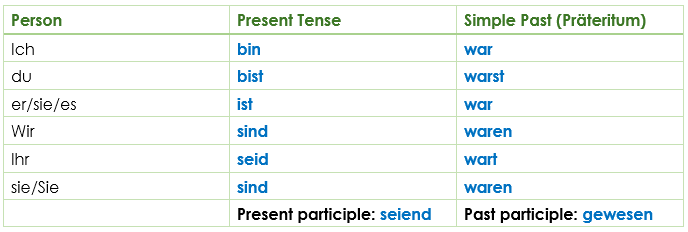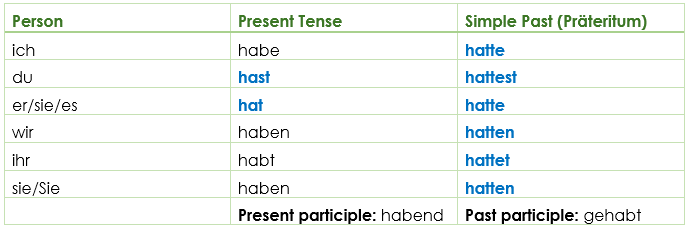„Sein” and „haben” in General
- The verbs „sein“ and „haben“ are two very important verbs in the German language that you will use quite often in many different situations.
- They can act as normal verbs meaning "to be" and "to have," as well as when constructing different Tenses.
Conjugation
Conjugation of „sein”:

„Sein” is 100% irregular.
Conjugation of „haben”:

Using „sein“ as a Main Verb:
We can use „sein“ in combination with Adjectives:
- „Du bist nett.“
- „Er ist arrogant.“
- „Ich bin schön.“
We can use „sein“ to identify Things, People and Animals (Names, Nationalities, Professions, ...):
- „Das ist Sebastian.“
- „Leo ist ein Löwe.“
- „Ich bin Deutschlehrer.“
We can use „sein“ to indicate Age, Date, and Time:
- „Sebastian ist 27 Jahre alt.“
- „Es ist schon 23 Uhr.“
- „Heute ist der 30. August.“
Using „haben“ as a Main Verb
We can use „haben“ to indicate possession:
- „Er hat ein Haus.“
- „Sie hat eine Puppe.“
- „Ich habe einen Fußball.“
We can use „haben“ in the case of a state referring to a noun:
- „Er hat Zeit.“
- „Sie hat lange Haare.“
- „Ich habe einen Bruder.“
Certain idioms with „haben“ are:
- „Ich habe Recht.“
- „Ich habe dich lieb.“
- „Er hat es eilig.“
„Haben“ and „sein“ as Helping Verb
You can learn how exactly to use „haben“ and „sein“ as helping verbs on the specific page of the tenses that need them:
Gramato: Your German Grammar Coach
Try Gramato now!
Powered by EasyDeutsch AI

This is how Gramato can help you!
Gramato helps you with all your German grammar questions – fast, to the point, and always based on the trusted content from https://easy-deutsch.com.
Gramato offers fill-in-the-blank exercises on a variety of grammar topics, tailored to your level so you can practice exactly what you need.
Get answers in multiple languages – German, English, Spanish, French, and more. That way, you can understand grammar in the language you feel most comfortable with.
Clear and simple grammar explanations – so you can learn faster and smarter with Gramato.
Ask your questions or practice anytime with Gramato – no wait, just results!
Related Topics:
Entire lesson in German only: „sein“ und „haben“
You can find more lessons on Verbs here:
- Was sind Verben? (What are Verbs?)
- Starke Verben (Strong Verbs)
- Reflexive Verben (Reflexive Verbs)
- Trennbare & Untrennbare Verben (Separable & Inseparable Verbs)
- Modalverben (Modal Verbs)
- Partizip 1 (Present Participle)
- Partizip 2 (Past Participle)
- Das Verb „werden” (Verb "werden")
- Das Verb „lassen” (Verb "lassen")
- Imperativ (Imperative)
- Konjunktiv 1 (Subjunctive 1)
- Konjunktiv 2 (Subjunctive 2)
- Das Passiv (Passive Voice)
- Vorgangspassiv (Process Passive)
- Das Passiv in allen zeitformen (Process Passive in all tenses)
- Verben ohne Passiv (Verbs without Passive voice)
- Zustandpassiv (Status Passive)
- Das unpersönliche Passiv (Impersonal Passive)
- Verben mit Ergänzungen (Verbs with Complements)
- Verben mit Nominativ (Verbs with Nominative)
- Verben mit Akkusativ (Verbs with Accusative)
- Verben mit doppeltem Akkusativ (Verbs with double Accusative)
- Verben mit Dativ (Verbs with Dative)
- Verben mit Akkusativ & Dativ (Verbs with Accusative & Dative)
- Verben mit Genitiv (Verbs with Genitive)
- Verben mit Präpositionen (Verbs with Prepositions)
Lists on the topic of German verbs:
- Die 30 wichtigsten Verben mit Vokalwechsel (The 30 most important verbs with vowel change)
- Untrennbare Präfixe (Inseparable Prefixes)
- Wechselpräfixe (Two-case Prefixes)
- Unregelmäßige Partizip 2 Formen (Irregular Participle 2 forms)
- Nomen-Verb-Verbindungen (Noun-Verb compounds)
You can find an overview of all topics under German Grammar.
Recommendation: Free video lessons every Tuesday & Thursday
Sign up now: Email German Grammar course


